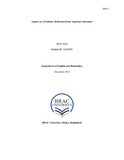| dc.description.abstract | Revelation of the female psyche, their predicaments, trials and tribulations and their resistance towards oppressive social forces are strong elements in the writings of Rabindranath Tagore. Tagore‘s writings, especially his novels and short stories bring out the erased portion of women‘s experience and show tremendous sympathy and understanding towards the plight of women which was quite an unfamiliar trend for most work of that period. Set in the Nineteenth Century Colonial Bengal, Tagore‘s writings portray the problems within Hindu custom and patriarchy, the uproar of spiritual and intellectual tension between Bengali Renaissance and tradition marked by the emergence of Colonial education and lives of Bengali, Hindu women in the juncture of all these social events. Controversial issues such as remarriage of Hindu window, co-cremation, the need for female education, their emancipation and the oppression caused through social injustice have found significant place in his writing. Thus his writings are valuable documents of societal changes in its relation to larger social context of gender, nation, and politics. His female characters come from diverse social settings and are inspirational as they struggle for space and autonomy. Through his works, Tagore is seen to break the false conventions of his society and thus liberating women from their bondages. Tagore‘s role in alleviating the minds of the Bengali reader is acknowledged anonymously today. Hence, this paper is an attempt to closely examine his writings towards the subversion of patriarchy and a force bringing changes in perspective on such issues. In doing so this paper not only looks at Tagore‘s selected works through a feminist lens but it also studies Tagore‘s own upbringing, influences from his family and the role of liberal education which he received leading him to write great humanist prose and poetry which are still read extensively. In gist, this paper explores women‘s lives through Tagore‘s writings and how he projects women as the most significant transformative factor within social dimension. | en_US |

